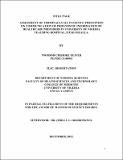UNNSpace Repository
Assessment of Terminally Ill Patients’ Perception on Communication of Prognostic Information by Healthcare Providers in University of Nigeria Teaching Hospital, Ituku/Ozalla
JavaScript is disabled for your browser. Some features of this site may not work without it.
| dc.contributor.author | Nwodoh, Chijioke Oliver
|
|
| dc.date.accessioned | 2017-06-20T11:15:28Z | |
| dc.date.available | 2017-06-20T11:15:28Z | |
| dc.date.issued | 2015-12 | |
| dc.identifier.uri | http://repository.unn.edu.ng:8080/xmlui/handle/123456789/5497 | |
| dc.description.abstract | This study investigated terminally ill patients’ opinion on communication of prognostic information by healthcare providers. It specifically determined the views of terminally ill patients on what healthcare providers communicated to them about their prognosis; which of the healthcare providers that communicates prognostic information to terminally ill patients; the condition under which healthcare providers communicate prognostic information to terminally ill patients and ascertained terminally ill patients desire to have prognostic information communicated to them. Utilizing a descriptive qualitative design, data were generated using a semi-structured interview guide and audio tape recorder, and simultaneously analyzed until data saturation point. Data was generated from 15 patients, 3 males and 12 females, who met the inclusion criteria. 7 major themes and 26 subthemes that emerged from the analysis showed that most healthcare providers do not tell terminally ill patients their prognosis; most prognostic information was communicated with high optimism; terminally ill patients tend to firmly believe God’s miracle for cure despite their life-ending prognoses; healthcare providers communicate prognosis to terminally ill patients ineffectively; doctors mostly communicate prognosis to terminally ill patients; healthcare providers mainly communicate prognosis early, in the presence of other people, in the clinic; and most terminally ill patients desire to have their prognoses communicated to them and their relatives. From the above findings, it is clear that there exists poor prognostic information communication approach by healthcare providers and the desire of terminally ill patients regarding prognostic information communication vary considerably. The implication, therefore, is that if not addressed, terminally ill patients in our locality may keep being faced with the problem of taking regrettable uniformed decisions about their condition. It is recommended that healthcare providers should receive further training for more effective individualized prognostic information communication to terminally ill patients in our locality. | en_US |
| dc.language.iso | en | en_US |
| dc.subject | Communication | en_US |
| dc.subject | Information | en_US |
| dc.subject | Healthcare | en_US |
| dc.subject | Healthcare providers | en_US |
| dc.subject | Illness | en_US |
| dc.subject | Health condition | en_US |
| dc.title | Assessment of Terminally Ill Patients’ Perception on Communication of Prognostic Information by Healthcare Providers in University of Nigeria Teaching Hospital, Ituku/Ozalla | en_US |
| dc.type | Thesis | en_US |
